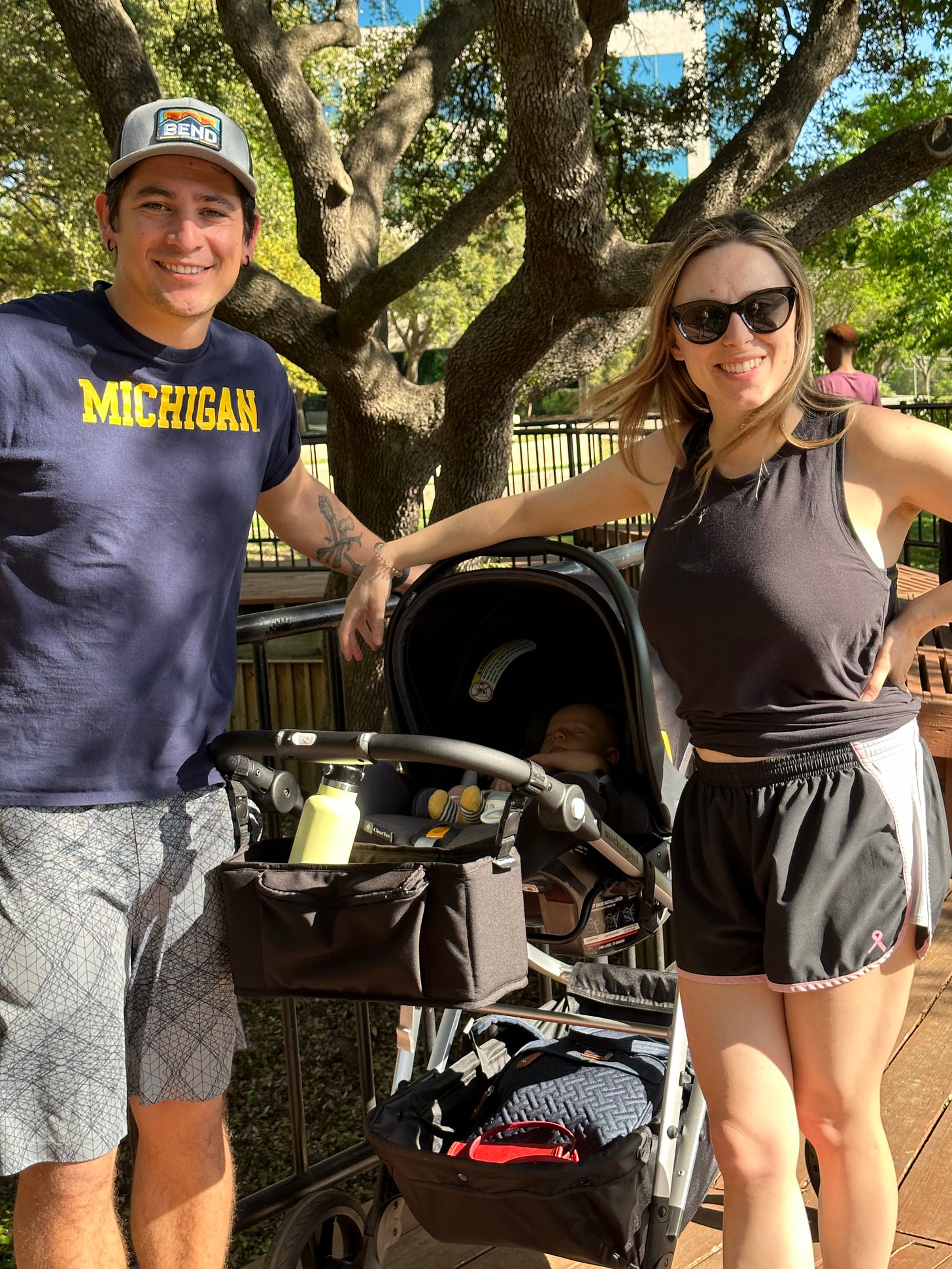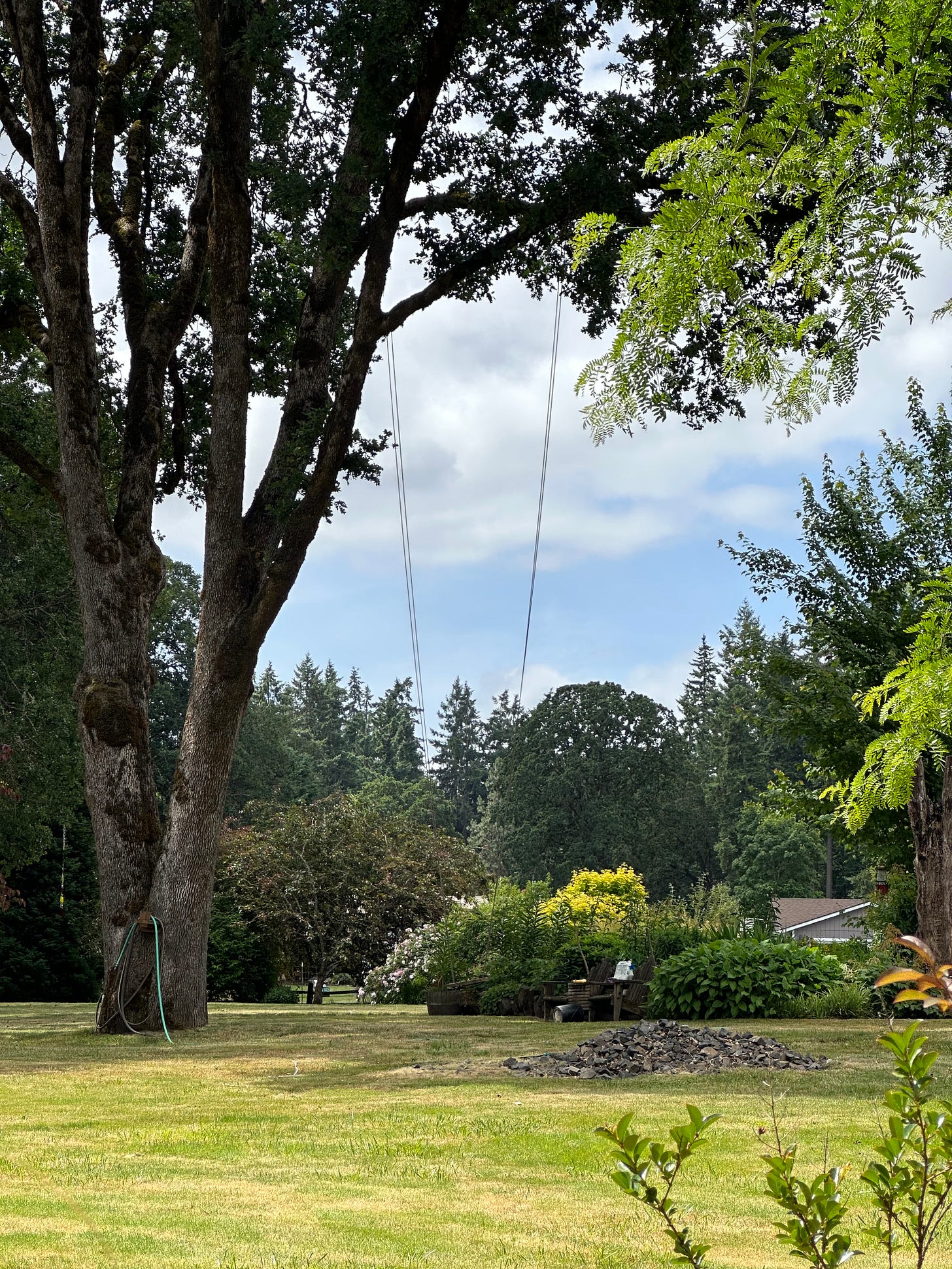Somewhere between high school and college, I lost the joy of moving my body.
I wish I could say that it was a temporary loss— like losing my tweezers and magnifying mirror (and always when my chin hair feels like a needle, by the way)—but that was not the case. My love of running, jumping, and playing—without ever thinking about how I looked or what result it would produce—sadly left me for a very long time.
As a kid, exercise—although I never thought of it as that—consisted of games such as run-the-bases, hopscotch, jump rope, dodgeball, hide-and-seek, and, if I was lucky, swimming in the neighbor’s pool when it was hot. As I got older, childhood games were supplemented by sessions of backyard gymnastics with my best friend: we practiced cartwheels, backflips, and splits over and over and over—until I could hardly walk the next day. Remembering the sheer joy of flipping (and sometimes flopping) across my front lawn still brings a smile to my face. Those sure were the days…
Perhaps you’re wondering what happened to cause such a shift in my perspective on movement. It was simple, really. It came down to a boyfriend speaking two simple words to me: “You’re fat.” Okay, if I’m honest, he didn’t communicate his judgment of my body in such direct terms. I believe the word he used was “pudgy”—cute if you are referring to a baby’s thighs but not so much when you’re speaking to an insecure college freshman who put on weight.
Thinking back, it’s rather startling how fast I went from being unconcerned about how I looked or consciously moved my body to suddenly feeling the need to transform myself into a far more acceptable shape. Movement, which had always represented fun and freedom to me, swapped places with “exercise,” which dictated that “x” amount of time had to pass and “x” number of calories had to be burned before it “counted.” Results—preferably measured as less pudge around my middle—became a driving factor in how and when I moved my body. Joyful movement had been replaced by dictatorial (and sometimes punishing) exercise, and although the results weren’t all bad, I’m here to make a case against it.
Rather than thinking of our bodies as something to be controlled or ignored, I invite you to consider the possibility that joyful movement should be our primary goal.
Before I do that, I want to acknowledge that my newfound exercise regime was not all bad. In fact, I did achieve some great results: 1) I lost the pudge. Sadly, this didn’t seem to shift how I felt about myself, but at least I didn’t pop buttons when I sat down. So there’s that… 2) I got strong. There’s nothing that says, “Don’t mess with me,” like being able to squat your body weight. Just sayin’…3) The runner’s high I got from exercise—a byproduct of the endorphin rush in my system—kept me from killing anybody. Okay, maybe that’s an exaggeration, but given the shoe-throwing incident I mentioned in last week's post, you can understand why the endorphin rush was critical for me. Although I don’t want to minimize how important these workouts were for me—for all the above reasons—I’m here to tell you that there was still something missing.
Exercising just to lose weight or to demonstrate that you have achieved rock star “quad” status in the gym is, quite frankly, missing the bigger picture. At the end of the day, God gave us arms and legs so we can move, and move we should. However, looking good (and wanting that hot summer body) is not exactly what God had in mind when he gave us appendages.
He called us to:
1. Work the land—“The Lord God took the man and put him in the garden of Eden to work it and keep it” (Gen 2:15)
2. Enjoy creation: “God saw all that he had made, and it was very good” (Gen 1: 31).
Just because most of us don’t work the land for a living or need to move very much to get our work done (apart from fingers to type), doesn’t mean we shouldn’t move. God gave us legs and arms for a reason. It’s critical that we steward our body—the temple of the Holy Spirit—with intentional care and kindness. Never moving (I’m looking at you, couch potatoes) is neglect. Punishing exercise is abuse and, therefore, unsustainable throughout your lifetime. So, what is the solution?
Move with intention and shoot for joy. That’s it!
Here’s the deal. If you are not committed to moving your body daily, you’re not honoring your God-given design. You were designed to move (arms and legs, remember?) Let me pause here for a second: If you sense objections coming up right now, I invite you to explore what is happening: be curious about your thoughts and try to identify your feelings. Some of you carry guilt and shame related to exercise, while others may feel defeated or hopeless. We each have “body stories” that impact the way we think about movement, and that’s okay.
It’s important that you become curious about your story.
Maybe you’ve only used exercise to punish yourself for overeating. Or, perhaps you were an athlete in high school and found team sports to be a way to fit in and feel good about yourself. Others may have experienced the trauma of always being picked last for teams in gym class and are still carrying the pain of that experience.
These stories impact how and why we move (or don’t move) today. It’s a good idea to explore your story, especially if you know you tend toward sedentary living or punishing exercise regimes. (If you want help with this, reach out.)
On the other hand, if you are a person who thinks of exercise as something to impose on your body, without regard for how it makes you feel, you may be missing out. Your emotions impact your body, and it can’t be separated from the spirit. All three aspects of your person—body, soul, and spirit—work together to bring health.
Gyms can serve an important function in a society with little need for manual labor anymore, but for most people, the thought of having to go to a gym for the rest of their lives just doesn’t work. Gyms don’t touch our souls like being in nature does. Despite the reality that the majority of us can meet our need for movement in our neighborhoods, we’re convinced that, somehow, it’s not good enough.
That just isn’t true.
I have more to say about this topic, but it will have to wait until next week. Until then, I invite you to take a minute to reflect on your own movement story. Here are some questions to think about:
Do you move your body with intention most days? If not, why is that?
Do you expect to feel joy when you move/exercise? Why not?
Do you ever force yourself to exercise because you overate?
How do you feel about your body? Do you notice shame anywhere in your body?
Do you check out when you are exercising?
What comes up for you when you think about the word “exercise”? Does it feel different to use the word “movement”?
I would LOVE to hear your thoughts on this post! Please comment below.









I just love to walk and be in the fresh air. I hate gyms and the pressure to ‘fit the part’ in those places. Exercise for me is regular quiet open spaces and gentle movement. Anything more than that feels like a chore or a stress to my body when I already have enough.
We have always enjoyed hikes too, but if it’s cold I feel it easily so I don’t like being out there too long.
For m exercise is a joy and necessity but with a calm approach. It’s not about weight though a good reason to move and be healthy.
When I’m walking I often pray or listen to worship songs. I know Gods closeness when I do this and sometimes will cry because everything else stops and I’m able to sense his closeness. It’s a beautiful thing.